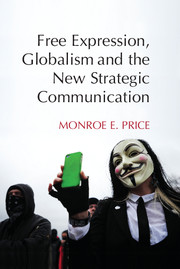Book contents
- Frontmatter
- Contents
- Acknowledgments
- 1 Moving the Needle, Filling the Streets
- 2 Strategic Communication and the Foundations of Free Expression
- 3 Narratives of Legitimacy
- 4 Strategies of the Diagnostic
- 5 Asymmetries and Strategic Communication
- 6 Strategies of System Architecture
- 7 Soft Power, Soft War
- 8 Religions and Strategic Communication
- 9 Regulating NGOs in the Market for Loyalties
- 10 Strategic Platforms
- 11 Strategic Communication and Satellite Channels
- 12 Strategies of Closure, Markers of Anxiety
- Bibliography
- Index
- References
7 - Soft Power, Soft War
Published online by Cambridge University Press: 18 December 2014
- Frontmatter
- Contents
- Acknowledgments
- 1 Moving the Needle, Filling the Streets
- 2 Strategic Communication and the Foundations of Free Expression
- 3 Narratives of Legitimacy
- 4 Strategies of the Diagnostic
- 5 Asymmetries and Strategic Communication
- 6 Strategies of System Architecture
- 7 Soft Power, Soft War
- 8 Religions and Strategic Communication
- 9 Regulating NGOs in the Market for Loyalties
- 10 Strategic Platforms
- 11 Strategic Communication and Satellite Channels
- 12 Strategies of Closure, Markers of Anxiety
- Bibliography
- Index
- References
Summary
If we were to rank traditional strategic communicators in terms of output and purpose, states would be among the strongest practitioners. Public diplomacy is the banner under which many forms of state-sponsored persuasion fly. That is the late-twentieth century term usually reserved for the efforts by one government to reach and affect publics in the territory of another. In this overall process, states use many tools, including state-sponsored international broadcasting, such as the Voice of America, the BBC World Service, Iran’s Press TV, CCTV 9 (part of China’s increasing efforts abroad) and RT (formerly Russia Today). States also deploy clandestine radio stations that emerge unknown and unwanted across borders and, more benignly, cultural exchanges that use art, travel and education as a way to increase influence.
Almost to the level of cliché, much has been written about “soft power” in this regard. Joseph Nye, the father of this term, has frequently described the concept as a combination of national culture, political ideals and policy through which states “attract” individuals, groups and governments in other states to the positions and culture of the projecting entity. Which instruments and approaches constitute the instruments of soft power or of public diplomacy – what should be included under these umbrellas and what belongs in another conceptual category – is hotly disputed among practitioners and theoreticians. Soft power can be very soft or surprisingly aggressive. From the perspective of the target society, exercises of soft power can be happily tolerated and are often reinforcing of the society’s own goals. But the situation is different when the sending society transmits what it declares as the height of enlightening information, but the target society (or its self-preserving government) sees as a hostile, debilitating intrusion. When is the exercise of strategic communication describable not merely as soft power but as something more controversial? Such questions warrant a more complex analytical evaluation.
- Type
- Chapter
- Information
- Free Expression, Globalism, and the New Strategic Communication , pp. 134 - 152Publisher: Cambridge University PressPrint publication year: 2014
References
- 1
- Cited by



